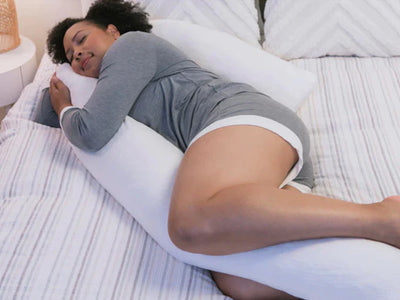
Related Product
What is Sleep Paralysis? Battling This Sleep Disorder
Share
If you’ve ever woken up in the middle of the night, unable to move, speak, or cry out, you may have experienced sleep paralysis. This unsettling experience, which is frequently characterized as feeling imprisoned within your own body, can linger anywhere from a few seconds to several minutes. Your body feels frozen during that moment, but your mind is awake. Despite being a fascinating, phenomenon, it can be very scary! Let us examine what sleep paralysis is, its causes, and preventative measures.
What is Sleep Paralysis?

Sleep paralysis occurs when a person becomes aware but cannot move or speak as they transition between wakefulness and sleep. This temporary inability to move occurs during rapid eye movement (REM) sleep, a stage where dreaming is most intense, and your body is naturally paralyzed to prevent you from acting out your dreams. The key issue arises when you wake up before your body has fully "unlocked" from this state of paralysis, leaving you conscious but motionless.
This unsettling experience is classified as a parasomnia, a type of sleep disorder that involves abnormal movements, behaviors, or perceptions during sleep. Although it's relatively harmless in terms of physical health, the sensation of being unable to move can be terrifying, especially when accompanied by hallucinations or a feeling of suffocation.
The Science Behind Sleep Paralysis
To understand sleep paralysis, it's essential to explore the stages of sleep. Sleep is divided into two main types: non-REM sleep and REM sleep. Non-REM sleep is the deeper, more restful part of the cycle, while REM sleep is when most of your dreaming occurs. During REM, your brain sends signals to relax your muscles, essentially keeping you "paralyzed" to prevent you from acting out your dreams.

Sleep paralysis happens when there's a disruption in the sleep cycle, specifically when you regain awareness before your body finishes the process of waking up. Essentially, your mind is awake, but your body remains in its paralyzed state from REM sleep. This mismatch between the brain and the body can result in the classic symptoms of sleep paralysis.
Common Symptoms of Sleep Paralysis

- Inability to move or speak: The most prominent symptom, lasting anywhere from a few seconds to a couple of minutes.
- Chest pressure or sensation of choking: Many people report feeling a weight on their chest, often causing panic or a feeling of suffocation.
- Hallucinations: This can include seeing shadowy figures, hearing strange noises, or feeling like someone is in the room.
- Fear or anxiety: The inability to move and the accompanying sensations often evoke feelings of intense fear.
What Causes Sleep Paralysis?
While anyone can experience sleep paralysis, certain factors may increase the likelihood of an episode. These include:
- Sleep deprivation: Not getting enough sleep can significantly disrupt your sleep cycle.
- Irregular sleep patterns: Shift work, jet lag, or other disruptions to a normal sleep schedule can interfere with your REM cycle.
- Sleep disorders: Conditions such as narcolepsy, insomnia, and sleep apnea are linked to a higher risk of sleep paralysis.
- Stress or anxiety: Mental health issues, such as high stress or anxiety, can make it more likely for a person to experience sleep paralysis.
- Sleeping on your back: People who sleep on their backs are more prone to experiencing the sensations of sleep paralysis.
How to Prevent Sleep Paralysis
Preventing sleep paralysis often comes down to improving sleep habits and maintaining a healthy sleep schedule. Here are some ways to reduce the chances of an episode:
- Maintain a consistent sleep schedule: Try to go to bed and wake up at the same time every day, even on weekends. Consistency is key to a healthy REM cycle.
- Get enough sleep: Aim for 7-9 hours of sleep each night to prevent the fatigue and sleep deprivation that can trigger sleep paralysis.
- Reduce stress: Engage in stress-relieving activities, such as meditation or gentle exercise, to lower your overall anxiety levels.
- Avoid caffeine and heavy meals before bed: These can disrupt sleep and increase the chances of interrupted REM sleep.
- Change your sleeping position: If you're prone to sleep paralysis, try sleeping on your side instead of your back.
When to See a Doctor
Sleep paralysis is a rare and generally benign condition for most people. Nonetheless, it can be worthwhile to speak with a healthcare provider if it occurs regularly or is causing a great deal of concern. Periodically, paralysis during sleep may indicate a more severe sleep ailment like narcolepsy. A sleep specialist can offer recommendations for treatments like medication or cognitive behavioral therapy as well as assist in diagnosing any underlying issues.
FAQ Section
-
Can sleep paralysis harm you physically?
No, sleep paralysis itself does not cause any physical harm. The sensation of being paralyzed can be scary, but it usually passes on its own within a few minutes. -
How long does sleep paralysis last?
Episodes of sleep paralysis typically last anywhere from a few seconds to a couple of minutes. Although it may feel much longer, the body eventually "wakes up" and regains the ability to move. -
Can sleep paralysis be prevented?
Yes, adopting good sleep hygiene, managing stress, and maintaining a consistent sleep schedule can help reduce the likelihood of experiencing sleep paralysis. -
Why do hallucinations happen during sleep paralysis?
Hallucinations during sleep paralysis are believed to occur because the brain is still in a dream-like state. This can lead to seeing or hearing things that aren't actually there, contributing to the feeling of fear. -
Is sleep paralysis related to mental health?
While sleep paralysis is not directly caused by mental health disorders, high levels of stress, anxiety, and certain mental health conditions can increase the likelihood of experiencing it.



